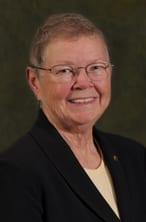Faculty Spotlight: Dr. Ida Cook
 A member of the Board of Trustees, chair of the Board’s Educational Programs Committee, co-developer of the Masters in Applied Sociology program, associate professor and previous Graduate Coordinator, Faculty Senate Chair, Ida Cook, Ph.D., has done it all at UCF. Dr. Cook dedicated 39 years of excellent service to the students, the University and the community.
A member of the Board of Trustees, chair of the Board’s Educational Programs Committee, co-developer of the Masters in Applied Sociology program, associate professor and previous Graduate Coordinator, Faculty Senate Chair, Ida Cook, Ph.D., has done it all at UCF. Dr. Cook dedicated 39 years of excellent service to the students, the University and the community.
Dr. Cook came to the university in 1976 when it was Florida Technological University under the tutelage of Dr. Charles Millican. During those 39 years, she has been a faculty member in the Department of Sociology and stalwart advocate of UCF. Throughout her time here, she has seen myriad changes; but more importantly, she has been an integral part of many of them.
In addition to enriching the lives of her students, Dr. Cook served as Faculty Senate Chair and Vice Chair, and was a regular member on numerous University-and College-level committees. Through these efforts, Dr. Cook has effectively improved the teaching, research, and service environment for all faculty at UCF.
Dr. Cook shares more about her time at UCF, her career, and advice to students in the spotlight responses below.
What attracted you to UCF?
Upon completing my Ph.D. at North Carolina State University, I began the process of finding an academic position at a university in Sociology with the goal of employing my training to be able to teach students research, theory, political sociology and community-based applied sociology. I had grown up in Jacksonville, FL and attended both UF (bachelor’s degree) and FSU (masters degree) and was familiar with the newer institutions of higher education. When a sociology position announcement at FTU appeared, I decided to apply. I knew it was one of the newer institutions in a growing area of central Florida, while at the same time having a smaller student population than the two larger Florida institutions of higher education. Since it was located between Cape Kennedy and Orlando, it seemed to offer me an opportunity to work with fellow sociology colleagues, be able to conduct research and help students learn about and apply their sociological knowledge to their surroundings. Altogether it offered me a really great opportunity to begin my professional career in sociology!
What is your best UCF memory?
There are so many memories, so I’ll have to identify more than one ‘best.’ I still have fond memories of working with my undergraduate and graduate research students, assisting local social service agencies and municipalities gather information to help them plan and develop their cities, counties and agencies meet the needs of their constituents. Another memory is the opportunity to work with fellow faculty members with various projects such as the FCTL, SPOI, revisions and improvements in the Faculty Constitution while ensuring that faculty input is included in broad areas of the university so that their views and recommendations are a valued and integral part of university decision-making process.
Additionally, I value my opportunity to represent the faculty as a member of the UCF Board of Trustees so that the faculty perspective and voice was better understood. I value the great role models from the previous Faculty Senate Chairs who served on the BOT and I’m pleased to have been able to serve. As part of my activities as Senate Chair, I had the honor of meeting Nobel Peace Prize winners, Bishop Desmond Tutu, social rights activist from South Africa, and Lech Walesa, former President of Poland and leader of Poland’s Solidarity movement, who influenced the shift of Poland from a communist to a post-communist government after the changes in Soviet Union. Additional best memories are, being able to attend the College of Medicine inaugural class ceremonies and of course seeing UCF become recognized for its outstanding academic achievements. Finally, becoming a major UCF fan!
What piece of advice would you give to current and future sociology students?
I always recommended that my students apply themselves to think and analyze situations objectively, to use logic and sociological discipline when examining social questions and issues and to always keep an open mind when alternative, sometimes contentious viewpoints are presented to them. Sociology, as a science, requires even the most controversial perspectives be evaluated and challenged logically and objectively – even when the ideas make students uncomfortable. While political correctness may filter ways in which thoughts and ideas are expressed, sociology should allow the freedom of expression as part of what a ‘true university’ represents. Sociology should be a place where healthy debate takes place so that a better understanding of views occurs.
What motivates you/What do you do for fun?
I’ve always been curious and looked for new ideas and experiences. These motivate me to find new and interesting ways to learn now that I have time to do so in retirement. Consequently I truly love to read – have a very long list of books to get to, to explore new perspectives – since retirees can (on space-available basis) I may start taking classes as a student at UCF, and also to travel to new and interesting places – I have a few more continents to visit and several others to re-visit!
